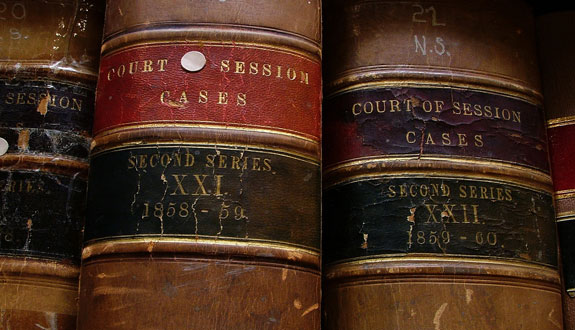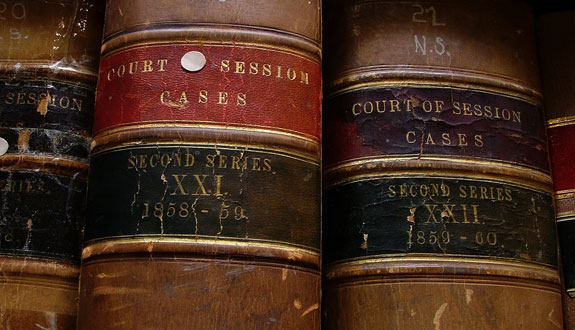LSAT Reading Comp Book Club IV: Books About Law
- by
- Mar 15, 2012
- Advice on Reading Comprehension, LSAT
- Reviewed by: Matt Riley


The focus for today’s LSAT Reading Comp Book Club is law. Each LSAT typically includes one passage on a law-related subject, and if you’re taking the LSAT, I’d hope you’re interested in the subject. Instead of talking about just one book, I’m going to give you three different works to consider this week.
My first two recommendations are non-fiction stories about how the law actually works. These stories are meant to be entertaining, but also realistic. Sort of like The Devil’s Advocate, except that the Al Pacino character isn’t literally the devil. Actually, there’s no Al Pacino character at all. If you’re reading a book about law and you realize that someone is saying something that sounds like an Al Pacino speech, that’s not what we’re going for here.
First up is A Civil Action by Jonathan Harr. This is the story of a crusading lawyer who brought a lawsuit on behalf of residents of a town in Massachusetts who had developed cancer that they believed was caused by toxic waste dumped nearby. The book is so realistic in its treatment of major litigation that it’s often assigned as required reading in law school civil procedure classes. In a similar vein, but less well-known (i.e. it hasn’t been made into a movie starring John Travolta), is The Buffalo Creek Disaster by Gerald M. Stern. Re-read my description of A Civil Action, but substitute “West Virginia” for “Massachusetts,” “been killed or injured in a flood” for “developed cancer” and “a negligent mining operation” for “toxic waste dumped nearby.” Both books are gripping and relatively easy to read.
If you don’t know much about how law actually works, these books can be enormously helpful in telling you what you’re getting into with this law school business. (Disclaimer: your actual experience as a lawyer will be far more boring than anything you read in these books.) They’re not convoluted enough to help much with your core reading comp skills, but they may give you some background that can help you understand certain passages. For example, there was a nasty LSAT reading comprehension passage a couple of years ago about a strange type of contingency fee agreement lawyers use in Australia. The passage was difficult for everyone, but if you knew a bit about contingency fee agreements, it was more manageable. You can view these kinds of books as your beach reading before law school.
The other book I want to recommend is not as easy to read, but it’s much more relevant to reading comp. It’s called Law’s Empire by Ronald Dworkin. The book is devoted to one of the most fundamental questions: what is law? If that sounds trivial or too abstract, think about it this way: The Fourteenth Amendment guarantees everyone “the equal protection of the laws.” But it says nothing explicitly about segregation, and in 1896 the Supreme Court infamously decided in Plessy v. Ferguson that segregation was acceptable. If you want to argue that “separate but equal” is unconstitutional, what allows you to say that your interpretation is right, and the Court’s decision in Plessy was wrong? Arguing over different interpretations of a law may be the most basic skill you learn in law school. You’ll do it all the time, but you may graduate without ever having thought about what exactly we mean when we say that one interpretation is right, and another, although reasonable, is wrong.
Dworkin attempts to answer just that question. He actually shows several potential answers, then argues why they’re all wrong and his interpretation is best. As you should know by now, learning to handle agreements and disagreements among multiple perspectives is a core LSAT skill. Dworkin’s book is particularly relevant because the LSAT test writers have referred to him and his theories in at least two passages, and they’ve done a couple more on the question, “What is law?” Clearly, they view this as fertile ground.
I should warn you, this book requires some philosophical heavy lifting. It’s more complicated than anything you’ll see in an LSAT passage. Think of yourself as a baseball player warming up in the on-deck circle with an extra heavy bat. That said, Dworkin doesn’t expect you to have any prior legal training before reading his book, and his book makes for an excellent introduction to the philosophy of law. If this stuff sounds interesting, go for it. It may give you a different and deeper perspective on everything you do in law school.
Search the Blog

Free LSAT Practice Account
Sign up for a free Blueprint LSAT account and get access to a free trial of the Self-Paced Course and a free practice LSAT with a detailed score report, mind-blowing analytics, and explanatory videos.
Learn More
Popular Posts
-
logic games Game Over: LSAC Says Farewell to Logic Games
-
General LSAT Advice How to Get a 180 on the LSAT
-
Entertainment Revisiting Elle's LSAT Journey from Legally Blonde








